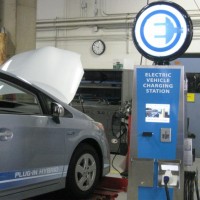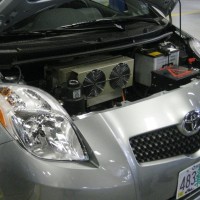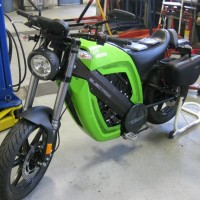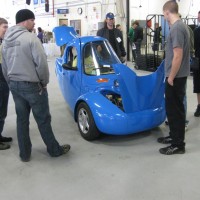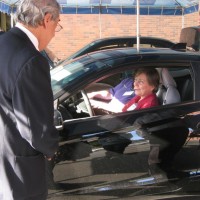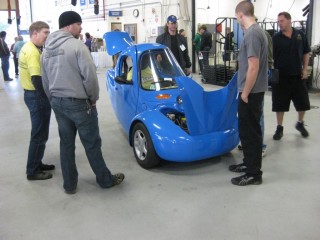This content was published: October 26, 2010. Phone numbers, email addresses, and other information may have changed.
Sylvania Campus showcases alternative fuel cars
Photos and Story by Kate Chester
Nearly 300 industry participants visited the Sylvania Campus on Oct. 15 to view the latest in alternative fuel vehicles as part of National Alternative Fuel Vehicle Day Odyssey, a nationwide, biennial campaign held in a variety of locations around the country. Among the close to 20 vehicles showcased were compressed natural gas models, hybrids, electric conversions, plug-in hybrids, biodiesel, propane and ethanol-fueled vehicles – and an electric, scooter-like Powercycle.
“The purpose of the event was to share information and display new technologies,” said Stan Sumich, technical training coordinator in the Automotive Service Technology program and Odyssey coordinator. “We want to remind people that there are other kinds of vehicle options out there.”
The Sylvania Campus has participated in National AFV Day Odyssey since 2002. Industry executives – fleet managers, technicians, purchasers and manufacturers, among others – have the opportunity to share their expertise with PCC faculty, staff and students, as well as network with colleagues about the latest industry trends.
This event is coordinated by the National Alternative Fuels Training Consortium, headquartered at West Virginia University. Portland Community College is a member of NAFTC, which develops curricula and training programs and conducts educational outreach activities on alternative fuel vehicles throughout the country. Other partners involved in the national Odyssey event include the U.S. Department of Energy and Clean Cities, a branch of the U.S. Department of Energy that promotes personal and commercial alternative fuel vehicles.
At the PCC Sylvania event, local partners included the Oregon Department of Energy and the Columbia-Willamette chapter of Clean Cities.
The Automotive Service Technology program at Sylvania continues to evolve and grow. The department recently won a grant of $200,000 from the Small Business Administration – Congressional Earmark Program to continue the development of its hybrid/plug-in charge technology program. For more information about Automotive Service Technology at Sylvania, visit: https://www.pcc.edu/programs/auto-service/

